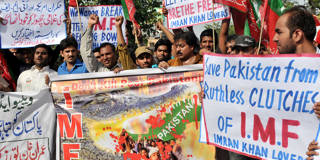Pakistan’s IMF Problem
In exchange for bailouts over the past three decades, Pakistani governments have repeatedly agreed to draconian spending cuts and arbitrary taxes in pursuit of fiscal targets. As a result, the country's economy is as weak as ever, and its state capacity has been hollowed out.

ISLAMABAD – After Pakistan’s recent election, Imran Khan and his Pakistan Tehreek-e-Insaf (PTI) party are now forming a new government. As usual, it will be greeted by an economic crisis. A trip, cap in hand, to the International Monetary Fund seems inevitable.